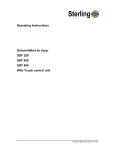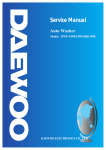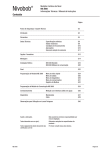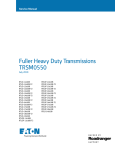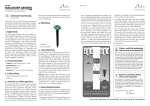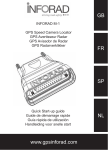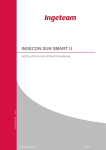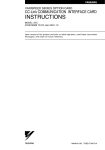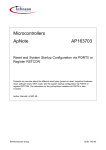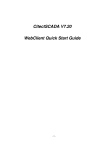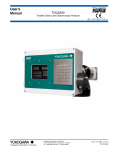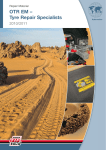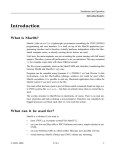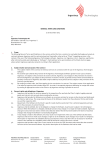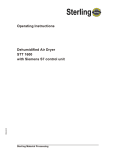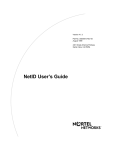Download RFnivo®
Transcript
RFnivo ® 1 Level limit switch Series RF 3000 Technical Information / Instruction manual Table of contents 2 Page Safety notes / Technical supportG2 3 IntroductionG3 ApplicationsG4 Technical data: DimensionsG5 4 Electrical dataG9 Mechanical dataG10 Operating conditionsG11 5 Transport and StorageG12 ApprovalsG13 OptionsG13 6 MountingG14 Electrical installationG20 QickstartG22 7 Advanced prorammingG29 Probe modifications G35 Assembly - Remote version / FM, FMc Control Drawing G36 TroubleshootingG37 8 MaintenanceG39 Notes for use in Hazardous Locations G41 DisposalG43 9 10 Subject to technical change. We assume no liability for typing errors. All dimensions in mm (inch). Different variations than specified are possible. Please contact our technical consultants. 11 12 RF 3000 gi241014 page G 1 1 RFnivo Level limit switch Series RF 3000 Technical Information / Instruction manual ® Safety notes / Technical support 2 Notes • • Installation, maintenance and commissioning may be accomplished only by qualified technical personnel. The product must be used only in the manner outlined in this instruction manual. 3 Special attention must be paid to warnings and notes as follows: WARNING 4 Relates to a caution symbol on the product: A failure to observe the necessary precautions can result in death, serious injury and/or considerable material damage. WARNING 5 Relates to a caution symbol on the product: Risk of electric shock WARNING 6 A failure to observe the necessary precautions can result in death, serious injury and/or considerable material damage. This symbol is used, when there is no corresponding caution symbol on the product. 7 8 CAUTION A failure to observe the necessary precautions can result in considerable material damage. Safety symbols In manual and on product Description CAUTION: refer to accompanying documents (manual) for details. 9 Earth (ground) Terminal Protective Conductor Terminal 10 Technical support Please contact your local supplier (for address see www.uwt.de). Otherwise you can contact: 11 UWT GmbH Tel.: 0049 (0)831 57123-0 Westendstr. 5 Fax: 0049 (0)831 76879 D-87488 Betzigau [email protected] www.uwt.de 12 page G 2 gi241014 RF 3000 RFnivo ® 1 Level limit switch Series RF 3000 Technical Information / Instruction manual Introduction 2 Applications Function The device is used for level monitoring in all types of containers and silos. The unit detects the capacitance between the probe and the container wall. It can be used with all powdery and granulated bulk materials, slurry and liquids. The performance allows to use the unit in a wide range of even difficult applications combined with simple handling: The units can be delivered with Ex-approvals for use in Dust and Gas Hazardous Areas. • Active shield technology The powerful active shield technology allows to ignore material build up on the probe. Even the influence of conductive build up on the probe is electronically compensated and thus ignored. This allows to measure with high sensitivity in combination with material build up. A selection of fields of application: • Building materials industry lime, moulding sand, etc. • Food industry sugar, flour, salt, etc. • Plastics industry plastics granules etc. • Timber industry chipped wood • Chemical industry pigments • Mechanical engineering The RFnivo is normally screwed into the lateral container wall at a position, where the material shall be measured. The device can also be mounted from the top of the container. In this case an extension piece is used to mount the probe level with the height to be measured. • Self diagnostics The unit is able to check the internal electronic for proper functionality. This can be done by setting a frequent auto test or by pressing a manual test button. • Auto calibration The unit will auto calibrate to uncovered state after first time power up. 3 4 5 It allows to set for auto recalibration to uncovered state. This is useful in case of a covered probe during power up. An auto recalibration is done when the probe becomes uncovered. • Manual recalibration to uncovered state can be done by simply pressing a push button. 6 • Full manual calibration can be selected as well. The sensitivity is preselected to work in most applications and can be changed if required. 7 The length of the probe can be up to 2.5m (98.4”) with rod extension or 20m (787") with rope extension. The use of a sliding sleeve is recommended so that the switch point can be changed continuously during operation of the device. 8 9 10 11 12 RF 3000 gi241014 page G 3 1 RFnivo ® Level limit switch Series RF 3000 Technical Information / Instruction manual Applications 2 3 4 5 6 7 8 9 10 11 RF 3100 RF 3200 RF 3300 A Inactive lenght to reach distance from silo wall • • • B Inactive lenght due to long mounting nozzle • • • C Full detector with short lengh • • • D Demand detector with short lengh, observe max. load • • • E Empty detector with short lenght, observe max. load • • • F Application in down pipe, observe max. load • • • G Inactive length to bring active probe to required level • • • H Inactive length and sliding sleeve for adjustable height • • I Full detector, rope version • • • J Empty detector, rope version, observe max. load • • • K Inactive lenght due to long mounting nozzle • • • 12 page G 4 gi241014 RF 3000 RFnivo 1 Level limit switch Series RF 3000 Technical Information / Instruction manual ® Technical data - Dimensions 2 Housing versions Aluminium Plastics PA6 Standard 3 4 de Explosionproof with increased safety terminal box 5 Aluminium 6 d Flameproof / explosionproof 7 Aluminium 8 Remote version 9 electronics inside no electronics inside aluminium Remote version exemplified with RF 3100 Spezial triaxial cable max. length: 20m (65ft) min. bending radius: 50mm (2") 10 Angle bracket 11 Remote cable 12 RF 3000 gi241014 page G 5 1 RFnivo Level limit switch Series RF 3000 Technical Information / Instruction manual ® Technical data - Dimensions 2 Probes RF 3100 Standard version Rod version Shortest length 3 Rod version Inactive extension Rope version Shortest length Rope version Inactive extension 4 5 6 7 8 * Active shield With EHEDG certificate the length "L" is increased by 9mm (0.35") 9 Process connections: Thread G 3/4" NPT 3/4" 10 Thread (except 3/4") Flange Triclamp 11 12 page G 6 gi241014 RF 3000 RFnivo 1 Level limit switch Series RF 3000 Technical Information / Instruction manual ® Technical data - Dimensions 2 RF 3200 Heavy Duty version Rod version Shortest length Rod version Inactive extension Rope version Shortest length Rope version Inactive extension 3 4 5 6 7 8 * Active shield 9 Process connections: Thread Flange 10 11 12 RF 3000 gi241014 page G 7 1 RFnivo Level limit switch Series RF 3000 Technical Information / Instruction manual ® Technical data - Dimensions 2 RF 3300 High temperature version Rod version Shortest length 3 Rod version Inactive extension Rope version Shortest length Rope version Inactive extension 4 5 6 7 8 9 * Active shield 10 Process connections: Thread 11 Flange 12 page G 8 gi241014 RF 3000 RFnivo 1 Level limit switch Series RF 3000 Technical Information / Instruction manual ® Technical data - Electrical data 2 Electrical data Connection terminals 0.14 - 2.5mm2 (AWG 26-14) Cable entry M20 x 1.5 screwed cable gland NPT 1/2“ conduit connection NPT 3/4” conduit connection 3 Clamping range (diameter) of the factory provided cable glands: M20 x 1.5: 6 .. 12mm (0.24 .. 0.47"") Signal delay Sensor uncovered -> covered or covered -> uncovered or covered <-> uncovered: adjustable ca. 0.5 to 60 sec Safety operation (FSL,FSH) Operation frequency Switchable for minimum or maximum safety Overvoltage category II Pollution degree 2 (inside housing) 4 ca. 100kHz Electronics Universal voltage Relay DPDT Power supply 21 .. 230V 50-60Hz or DC ±10%* *incl. ±10% of EN 61010 Max. ripple of power supply Installed load 7 Vss at DC sypply 5 6 max. 1.5VA or 1.5W 7 Signal output Floating relay DPDT AC max. 250V, 8A non inductive DC max. 30V, 5A non inductive Display 4 digit LCD Display of actual measured capacitance, signal output state and self diagnostics Min. operating temperature: -30°C (-22°F) Indicating light Status by 3 colour built-in LED (according to NE44): Power on, signal output, failure /maintenance Data storage Nonvolatile EPROM for Menu settings and calibration data Isolation Power supply to signal output: 2225Vrms Signal output to signal output: 2225Vrms Protection class I 8 9 10 11 12 RF 3000 gi241014 page G 9 1 RFnivo Level limit switch Series RF 3000 Technical Information / Instruction manual ® Technical data - Mechanical Data 2 Mechanical data Housing Aluminium, powder coated RAL 5010 gentian blue Optional: Plastics PA6 reinforced Seal between housig and lid: NBR Seal between housing and process connection: NBR Nameplate: polyester film Degree of protection IP 67 (EN 60529), NEMA Type 4X Process connection / probes RF 3100: Material: Stainless steel 1.4301 (304)/1.4305 (303) or 1.4404 (316L)/1.4401(316) for rope Probe isolation PPS reinforced Coating of probe/rope (optional) PFA Thread: G 3/4", 1", 1¼", 1½“ DIN 228, M30x1.5, M32x1.5, NPT 3/4", 1", 1¼”, 1½“ tapered ANSI B 1.20.1 Triclamp: 1" (DN25), 1½" (DN40), 2" (DN 50) ISO 2852 RF 3200: Material: Stainless steel 1.4301 (304)/1.4305 (303) or 1.4404 (316L)/1.4401(316) for rope Probe isolation PPS reinforced Thread: G 1¼, 1½“ DIN 228, NPT 1¼”, 1½“ tapered ANSI B 1.20.1 RF 3300: Material: Stainless steel 1.4301 (304)/1.4305 (303) or 1.4404 (316L)/1.4401(316) for rope Probe isolation ceramic Thread: G 1¼, 1½“ DIN 228, NPT 1¼”, 1½“ tapered ANSI B 1.20.1 3 4 5 6 Flanges according to selection 1.4541 (321) or 1.4404 (316L) All material food grade Sound level 7 max. 40dBA Overall weight (ca.) Standard housing dehousing dhousing 3.0 kg (6.6 lbs) 3.6 kg (8.0 lbs) 2.8 kg (6.2 lbs) 2.7 kg (6.0 lbs) 3.3 kg (7.3 lbs) 3.8 kg (8.4 lbs) Active probe length: L1** +0.62 kg/m (1.37 lbs/39.3“) +0.06 kg/m (0.13 lbs/39.3“) 4.1 kg (9.0 lbs) +3.0 kg/m (6.61 lbs/39.3“) +3.26 kg/m (7.19 lbs/39.3“) 4.0 kg (8.8 lbs) 3.6 kg (8.0 lbs) 4.8 kg (11 lbs) 5.0 kg (11 lbs) 4.6 kg (10 lbs) 5.8 kg (13 lbs) 5.3 kg (12 lbs) 4.9 kg (11 lbs) 6.1 kg (13 lbs) +0.26 kg/m (0.57 lbs/39.3“) +3.0 kg/m (6.61 lbs/39.3“) +0.26 kg/m (0.57 lbs/39.3“) +3.26 kg/m (7.19 lbs/39.3“) +3.26 kg/m (7.19 lbs/39.3“) +3.26 kg/m (7.19 lbs/39.3“) Basic weight* 8 9 RF 3100 rod version RF 3100 rope version 1.7 kg (3.7 lbs) 2.3 kg (5.1 lbs) RF 3200 rod version RF 3200 rope version RF 3300 rod version RF 3300 rope version Inactive length: L2** +1.2 kg/m (2.65 lbs/39.3“) +1.2 kg/m (2.65 lbs/39.3“) Total weight = Basic weight + active probe length L1 + inactive length L2 All weights with 1 1/4" NPT process connection and without flanges * Rode version with shortest length L1=100mm (3.9"), rope version without rope **Refer to dimension drawings on page G6-G8 10 11 12 page G 10 gi241014 RF 3000 RFnivo 1 Level limit switch Series RF 3000 Technical Information / Instruction manual ® Technical data - Operating conditions 2 Operating conditions Ambient temp. (housing) -40°C.. +70°C (-40 .. +158°F) Process temperature RF 3100 / 3200: RF 3300: -40°C.. +240°C (-40 .. +464°F) -40°C.. +500°C (-40 .. +932°F), versions with Ex-approvals: +445°C (+833°F) 3 . 4 For versions with Ex-approvals: see remarks on page G42. 5 Ventilation Ventilation is not required Max. range / max sensitivity 3 .. 100pF / 0.5pF 3 .. 400pF / 2pF Spark protection Robust build in protection against static discharge of the bulk material. Features of bulk material Min. DK depending on selected probe length L1 and probe diameter. See tables on page G25 and G32. 6 Max. mechanical load Max. load with rod version 7 All ratings for 40°C (104°F) RF 3100 Rod version: Rope version: A: 125 Nm 4 kN tensile load RF 3200 Rod version: Rope version: A: 525 Nm B: 90 Nm 40 kN tensile load RF 3300 Rod version: Rope version: A: 525 Nm B: 20 Nm 10 kN tensile load 8 B: 20 Nm 9 Max. process pressure 10 The max. process pressure may be reduced with use of flanges. Observe flange standards for pressure rating and pressure derating with higher temperature. 11 For versions with Ex-approvals: Further see remarks on page G41. 12 RF 3000 gi241014 page G 11 1 RFnivo Level limit switch Series RF 3000 Technical Information / Instruction manual ® Technical data - Operating conditions 2 Vibration 1.5 (m/s2) 2 /Hz according to EN 60068-2-64 Relative Humidity 0-100%, suitable for outdoor use Altitude max. 2.000m (6.562ft) 3 Expected product lifetime Following parameters have a negative influence on the expected product lifetime: High ambient- and process temperature, corrosive environment, high vibration, high flow rate of abrassive bulk material passing the sensor element. 4 Transport and Storage Transport Observe the instructions as stated on the transport packaging, otherwise the products may get damaged. Transport temperature: -40 .. +80 °C (-40 .. +176 °F) Transport humidity: 20 .. 85 % 5 Transport incoming inspections must be caried out to check for possible transport damage. Storage Products must be stored at a dry and clean place. They must be protected from influence of corrosive environment, vibration and exposure to direct sunlight. Storage temperature: -40 .. +80 °C (-40 .. +176 °F) Storage humidity: 20 .. 85 % 6 7 8 9 10 11 12 page G 12 gi241014 RF 3000 RFnivo 1 Level limit switch Series RF 3000 Technical Information / Instruction manual ® Approvals / Options 2 Approvals General Purpose * (Ordinary Locations) CE FM / FMc EN 61010-1 Hazardous Locations * ATEX Dust explosion Protection by enclosure II 1/2D Ex ia/tb IIIC T! Da/Db Gas explosion Flameproof Flameproof / increased safety II 2G II 2G Dust explosion Gas explosion Protection by enclosure Ex ia/tb IIIC T! Da/Db Flameproof Flameproof / increased safety Ex d ia IIC T! Gb Ex de ia IIC T! Gb Dust explosion Protection by enclosure Cl. II, III Div.1 Gr. E,F,G Gas explosion Flameproof XP-IS Cl. I Div.1 Gr. A-D Cl. I Zone 1 Gr. IIB+H2 IEC-Ex FM / FMc 3 Ex d ia IIC T! Gb Ex de ia IIC T! Gb 4 5 Detailed allocation of types and electronic modules to approvals: see selection list. EMC EN 61326 -A1 Hygiene * EHEDG (Type ED) Food grade material According to directive 1935/2004/EC Pressure Equipment Directive (97/23/EC) The units are not subject to this directive, because they are classified as „pressure-keeping equipment“ and do not have a pressurized housing (see Art.1, clause 2.1.4). The units are designed and manufactured in accordance to the Pressure Equipment Directive. The unit is NOT intended for use as a “equipment part with safety function (Art.1, clause 2.1.3). If the units should be used as „equipment part with safety function, please contact the manufacturer. * depending on selected version in the selection list. 6 7 8 Options Various options are available, see pricelist for more details: Remote version • Probe and electronic housing separated (cable length up to 20m (65ft)) Electronics • Preselected sensitivity (factory setting of switching sensitivity ) Probes • Coating rod version (active probe or complete probe) • Coating rope version (rope) • Extension kits (rigid or flexible rod extension, rope extension) Mounting • Sliding sleeve (flexible height adjustment of the probe) • EHEDG approval (Type ED) • Mounting sets: Screws, washers, sealings for fixing the unit on a flange. Housing • • • • • 9 10 Housing material plastics PA6 Weather protection cover (PE, weathering and temperature stable) Cable entry (metric or NPT with different size) Signal lamp (indiation of signal output state from outside) Plugs (valve connector, M12 plug, Harting) 11 12 RF 3000 gi241014 page G 13 1 RFnivo ® Level limit switch Series RF 3000 Technical Information / Instruction manual Mounting 2 General Safety Instructions Process pressure Improper installation may result in loss of process pressure. Seal the process thread with Teflon tape in case of process pressure A plastic sealing must be used to tighten the flange. Fastening of the threaded process connection Mounting torque for the thread may not exceed 80Nm. Use a fitting open-end wrench. Do not fasten by turning the housing. Sliding sleeve: Tighten both straining screws M8 with 20 Nm to obtain resistance against pressure. Direction of the cable glands When the unit is mounted from the side, ensure, that the cable glands faces downwards and are closed to avoid water penetration into the housing. The housing can be rotated against the process connection after mounting. Chemical resistance against the medium Materials of construction are chosen based on their chemical compatibility (or inertness) for general purposes. For exposure to specific environments, check with chemical compatibility charts before installing. Temperature range The range of the ambient and process temperature of the device must be observed. Mechanical load The rated values must not be exceeded. EHEDG / Food grade material The materials are available for the use under normal and predictable applications (according to directive 1935/2004 Art.3). Other conditions can influence the safety. 3 4 5 6 7 8 Additional Safety Instructions for Hazardous Locations Installation regulations For devices to use in hazardous locations the respectively valid installation regulations must be observed. Sparks The installation has to be done in a way mechanical friction or impact can not cause sparks between the aluminium enclosure and steel. Weather protection cover The weather protection cover is approved for Zone 2, 22 and Div.2 9 10 11 12 page G 14 gi241014 RF 3000 RFnivo ® 1 Level limit switch Series RF 3000 Technical Information / Instruction manual Mounting 2 EHEDG Approval Seal the thread with teflon tape against process pressure. Metal-metal sealing: • The support muß be plane and without any gap. No teflon tape (or similar) is allowed to be in between. • Fixing torque 100Nm 3 The quality of the welding with the container wall must be according to the respective regulations (e.g. gaps, transitions, surface finish). 4 Total length L + 9mm (0.35") Flush welding socket 5 metal-metal sealing seal thread with teflon tape 6 welding with container wall 7 Dimension of flush welding socket (for optional on site manufacturing): Surfaces in contact with process Ra <=0.8um Section B Section A 8 Dimensions in mm 9 * suggested values (in brackets values to be adhered bindingly) 10 11 12 RF 3000 gi241014 page G 15 1 RFnivo Level limit switch Series RF 3000 Technical Information / Instruction manual ® Mounting 2 Mounting: Rod version Observe distance to active probe Active probe Active probe 3 CORRECT Horizontal mounting CORRECT Oblique mounting Helps remaining material to fall off 4 Active probe 5 Active probe CORRECT Long socket. Use of inactive length. 6 CORRECT Extensive material build up. Use of inactive length. 7 8 WRONG Active probe inside socket. 9 WRONG Active probe inside material build up. WRONG: Active probe inside intersection between cylindric and conical part of the silo (material may stay when silo is empty) 10 11 12 page G 16 gi241014 RF 3000 RFnivo ® 1 Level limit switch Series RF 3000 Technical Information / Instruction manual Mounting 2 Observe min. distance between two sensors, to metal silo wall and to protective angle. 3 4 5 Grounding reference with non metal silos The inner or outer PE terminal must be connected to reach a grounding reference. Further mounting requirements • Observe distance to material flow (filling). • Protective angle recommended depending on mechanical load and abrasion of the material. Switching point With proper calibration the signal output switches when the active probe is covered by material. 6 7 8 9 10 11 12 RF 3000 gi241014 page G 17 1 RFnivo Level limit switch Series RF 3000 Technical Information / Instruction manual ® Mounting 2 Mounting: Rope version Observe distance to active probe 3 CORRECT Long socket. Use of inactive length. CORRECT Short socket. WRONG Active probe inside socket. WRONG: Active probe inside intersection between cylindric and conical part of the silo (material may stay when silo is empty) Active probe 5 Active probe 4 6 Observe min. distance between two sensors and to metal silo wall. 7 8 9 10 11 Grounding reference with non metal silos The inner or outer PE terminal must be connected to reach a grounding reference. Further mounting requirements • Observe distance to material flow (filling). • Empty detector: Do not mount above the center of the silo outlet due to high traction force. • Unit must be installed vertical. 12 page G 18 gi241014 RF 3000 RFnivo 1 Level limit switch Series RF 3000 Technical Information / Instruction manual ® Electrical installation 2 General Safety Instructions Handling In the case of inexpert handling or handling malpractice the electric safety of the device cannot be guaranteed. Protective earthing Before any electrical installation, the terminal inside the housing must be connected to the protective earth. Installation regulations The local regulations or VDE 0100 (Regulations of German Electro technical Engineers) must be observed. WIth use of 24V supply voltage, an approved power supply with reinforced insulation to mains is required. Fuse Use a fuse as stated in the connection diagrams. RCCB protection In the case of a defect, the distribution voltage must automatically be cut off by a RCCB protection switch so as to protect the user of the device from indirect contact with dangerous electric tensions. Power supply switch A Power-supply-disconnecting switch must be provided and marked near the device. Wiring diagram The electrical connections have to be made according to the wiring diagram. Supply voltage Compare the supply voltage applied with the specifications given on the electronic and name plate before switching the device on. Cable gland / closing element The screwed cable gland and closing element must have following specifications: 3 4 5 6 Ingress protection IP67, temperature range from -40°C to +80°C, UL or VDE certified (depending on the country where the unit is installed), pull relief. Make sure that the screwed cable gland safely seals the cable and that it is tight (danger of water intrusion). Cable glands that are not used have to be locked with a closing element. 7 A strain relief must be provided for the field wiring cables, when the device is installed with the factory provided cable glands. Conduit system In case of using a conduit system (with NPT thread) instead of a cable gland the regulations of the country where the unit is installed must be observed. The conduit must have a tapered thread either NPT 1/2“ or NPT 3/4” in accordance with the unit and ANSI B 1.20.1. Not used inlets must be closed tight with a metal closing element. 8 Field wiring cables • The diameter has to match to the clamping range of the used cable gland. • The cross section has to match with the clamping range of the connection terminals and consider the max. current. • All field wirings must have insulation suitable for at least 250V AC. • The temperature rating must be at least 90°C (194°F). • If higher immunity interferences as specified in the stated EMC standards are present (see chapter approval), a shielded cable is required, otherwise an unshielded instrumentation cable is satisfactory. 9 Connecting the terminals Make sure that max. 8mm (0.31“) of the pigtails are bared (danger of contact with live parts). Guiding the cables in the terminal box Cut the field wiring cables to appropriate length to fit properly into the terminal box. Remote housing The remote cable must be installed sepatated from power supply lines to avoid immunity interferences The min. bending radius of 50mm must be observed. 10 11 12 RF 3000 gi241014 page G 19 1 RFnivo Level limit switch Series RF 3000 Technical Information / Instruction manual ® Electrical installation 2 3 4 Relay protection Provide protection for relay contacts to protect the device against spikes with inductive loads. Protection against static charging The housing of the unit must be grounded in any case to avoid static charging of the unit on applications with pneumatic conveying and non-metallic containers . Before opening the lid take care, that the unit is clean and no water or dirt can enter into the housing. Opening the lid Additional Safety Instructions for Hazardous Locations External equipotential bonding terminal Connect with equipotential bonding of the plant 5 Field wiring 6 A pull relief must be provided for the field wiring cables, when the device is installed with the factory provided cable glands. Field wiring terminals for Fixing torque : 0,5-0,6Nm “de” housing Remove wire isolation: 9mm Cable glands and conduit Installation according to the regulations of the country, where the product is installed. system for ATEX / IEC-Ex (Dust and Gas Hazardous Not used entries have to be closed with blanking elements certified for this purpose. Locations) Where available the factory provided parts must be used. 7 A strain relief must be provided for the field wiring cables, when the device is installed with the factory provided cable glands. If other than the factory provided parts are used, following must be ensured: The parts must have an approval adequate to the approval of the level sensor (certificate and type of protection). The approved temperature range must be from the min. ambient temperature of the level sensor to the max. ambient temperature of the level sensor increased by 10 Kelvin. The parts must be mounted according to the instructions of the supplier. 8 Conduit system for FM (Dust and Gas Hazardous 9 10 Locations) General requirements: In addition the regulations of the country must be observed. The used flameproof seals and blanking elements must have an adequate type approval and a temperature range of at least –40°C (-40°F) to +80°C (176°F). In addition they shall be suitable for the conditions and correctly installed. Where available the provided original parts of the manufacturer must be used. Installation of a flameproof enclosure “d” with a conduit system: In a conduit system single electric conductors are installed in a certified pipe system. This pipe system is in a flameproof construction as well. The flameproof enclosure “d” and the pipe system needs to be sealed from each other by a certified flameproof seal. Conduit entries of a flameproof enclosure “d” shall have installed the flameproof seal within 18 inches from the enclosure wall. Not used entries have to be closed with adequate blanking elements of a certified flameproof type AEx Cl.1 Div.1 A. Opening the lid Units with Dust Explosion approval: Before opening the lid take care, that no dust deposits or whirlings and no hazardous atmosphere is present. Units with flameproof GasExplosion approval (d-housing): To prevent ignition of hazardous atmospheres, do not remove the lid (cover) while circuits are alive. 11 12 page G 20 gi241014 RF 3000 RFnivo 1 Level limit switch Series RF 3000 Technical Information / Instruction manual ® Electrical installation 2 Connection Standard housing Connecting terminals d-housing de-housing Connecting terminals Connecting terminals 3 4 5 Protective Conductor Terminal Protective Conductor Terminal Protective Conductor Terminal 6 Universal voltage Relay DPDT Power supply: 21 .. 230V 50/60Hz or DC +/-10% 1.5VA or 1.5W 7 Fuse on power supply: max 10A, 250V, HBC, fast or slow Signal output: 8 Floating relay DPDT AC max. 250V, 8A, non inductive DC max. 30V, 5A, non inductive Signal output Fuse on signal output: max 10A, 250V, HBC, fast or slow Power supply 9 10 11 12 RF 3000 gi241014 page G 21 1 RFnivo ® Level limit switch Series RF 3000 Technical Information / Instruction manual 2 3 4 5 Quickstart 6 7 8 9 10 11 12 page G 22 gi241014 RF 3000 RFnivo ® 1 Level limit switch Series RF 3000 Technical Information / Instruction manual Quickstart 2 User interface 3 LEDs: Green = relay activated Yellow = relay idle Red = maintenance (blinking), error (on) Display 4 Power up calibration at first time operation 5 Behaviour after first time power up (factory setting). If unit is switched OFF and then again ON, this calibration will NOT be repeated. 1. Ensure material level is well below the probe. Ensure that the unit is properly mounted and the material level is well below the probe, since the unit will calibrate to an uncovered probe. 6 2. Power up calibration After first time power up, the unit will automatically calibrate. During calibration (ca. 45 seconds) display states "CAL", red LED is blinking. After calibration display states the actual measured capacitance followed by "u" for "Signal output states uncovered". 7 If other statements on the display are present, see Trouble shooting, page G37. 3. Checking Quickstart settings If required to change the factory settings for Fail Safe High/Low, Signal output delay or Sensitivity, use Quickstart menu (see page G24). Unit is ready to work Measurement mode 9 The unit states the actual measured capacitance and the state of the signal output Display LED Explanation XXX u XXX c green/yellow* Actual measured capacitance in pF. Actual signal output: states uncovered probe "u" or covered probe "c" 8 Resolution is 0.1pF (<100pF) or 0.5pF (>100pF). If values are >100pF, a dot behind the number means 0.5 pF (e.g. 100. means 100.5pF) Note: If the actual measured capacitance is higher than electronic can measure (>400pF with sensitivity setting >=2pF or >100pF with sensitivity setting <=1pF), the unit will state "400c" or "100c". The measurement is valid, since the actual capacitance is well above the calibrated switchpoint. Signal output states covered probe "c" in any case. * Green or yellow depending on FSH/FSL setting, see page G24. 10 11 If other statements on the display are present, see Trouble shooting, page G37. 12 RF 3000 gi241014 page G 23 1 RFnivo Level limit switch Series RF 3000 Technical Information / Instruction manual ® Quickstart 2 Quickstart menu Note: Red LED is blinking during Menu setting • When the unit is in Measurement mode, press MENU button for 3 sec to enter in Quickstart menu. Note: If "Code" is displayed, a Lock Code is required. Set the code number with the arrow buttons and confirm with the Menu button. Then press again the Menu button for 3 sec to enter in Quickstart menu. • Press for 3 sec to return to Measurement mode. • Press for <1 sec to store setted value and jump to next menu item. 3 • Arrow buttons increase / decrease the value to be setted 4 5 6 7 Display Explanation Menu item A. FSH * FSL Fail Safe High Fail Safe Low Signal output, Fail safe setting B. ALL * C-U U-C Covered probe <-> Uncovered probe Covered probe -> Uncovered probe Uncovered probe -> Covered probe Signal output , Delay direction C. 0,5 * 2 5 to 60 seconds Signal output , Delay time Adjustable in steps (increment is 5 seconds) D. 0,5 1 2 ** 4 10 15 25 35 pF Sensitivity Required capacitance increase between uncovered probe (after calibration) and switch to output "covered probe". Change presetted value only if required by the application, see calibration guide on page G25. Note: Menu item D is not valid and will not bee shown on the display, if Manual calibration (Menu item G) is set to ON. * Factory setting ** Standard Factory setting is 2pF. Optional other setting is present (depending on order) 8 FSH / FSL Setting 9 FSH: Set as full detector. Power failure or line break is stated as "full" signal (protection against overcharging). FSL: Set as empty detector. Power failure or line break is stated as "empty" signal (protection against dry running). Setting 10 Signal output Relay DPDT LED yellow green yellow green power failure 11 uncovered probe covered probe 12 page G 24 gi241014 RF 3000 RFnivo 1 Level limit switch Series RF 3000 Technical Information / Instruction manual ® Quickstart 2 Push button calibration - Calibration guide Push button calibration needs to be done, if "Power up calibration at first time operation" was not sucessful or unit was changed to another location or a significant change of DK was present after changing of material. This guideline is applicable for most applications. Some critical applications (e.g. excessive buildup, special mounting) may be considered different. A proper selection of the active probe length is necessary in any case to reach a satisfactory change of capacitance between uncovered and covered probe, see recommendations in the external selection list (pricelist). The table below is based on a proper active probe length. • Calibration with uncovered probe only: This method is most simple and thus recommended to be done if ever possible. It is applicable for higher DK values which give a higher change of capacitance between uncovered and covered probe. The DK value of the material is roughly required to be known to be able to set the sensitivity. See external list for dielectric constant (DK) of different materials. • Calibration with uncovered and covered probe: This method is most safe, since it sets the switchpoint in the middle between uncovered and covered probe capacitance. This ensures the max. switching distance to both uncovered and covered probe capacitance and thus ensures the max. tolerance against e.g. material buildup. The method is required for lower DK values which give a lower change of capacitance. The DK value of the material is not required to be known. DK Sensitivity Setting Calibration Uncovered and covered probe < 1.5 - - - 1.5 ... 1.6 - 0.5 pF* A 1.7 ... 1.9 B 1 pF* C 2.0 ... 2.9 B 2 pF C 3.0 ... 4.9 B 4 pF C 5.0 ... 10 B 10 pF C > 10 B 15 pF Calibration prodedure see page G26 4 5 6 Push button calibration - Calibration guide Calibration Uncovered probe only 3 7 C 8 Calibration prodedure see page G27 A = Required B = Recommended (most simple calibration method) C = Possible as an alternative - = Not applicable * Not possible with remote version with remote cable length >10m (33ft) and outdoor installation (temperature drift). 9 10 11 12 RF 3000 gi241014 page G 25 1 RFnivo Level limit switch Series RF 3000 Technical Information / Instruction manual ® Quickstart 2 Push button calibration - Calibration procedure - Uncovered probe only Explanation of calibration procedure: 3 Capacitance Capacitance Uncovered probe Sensitivity Switchpoint Capacitance Covered probe 1. Ensure material level is well below the probe. Ensure that the unit is properly mounted and the material level is well below the probe, since the unit will calibrate to an uncovered probe. 2. Set Sensitivity Check for the required Sensitivity depending on the material to be measured, use calibration guide on page G25. 4 5 A B C D Set the Sensitivity in the Quickstart Menu, item "D", see page G24. 6 3. Press CAL button for 3 seconds During calibration the display states "CAL", the red LED is blinking. Wait until calibration is finished (ca. 10 seconds). Then display states the actual measured capacitance followed by "u" for "Probe uncovered". Note: If "Code" is displayed, a Lock Code is required. Set the code number with the arrow buttons and confirm with the Menu button. Then press again the CAL button for 3sec to start calibration. 7 If other statements on the display are present, see Troubleshooting, page G37. Unit is ready to work. 8 9 10 11 12 page G 26 gi241014 RF 3000 RFnivo 1 Level limit switch Series RF 3000 Technical Information / Instruction manual ® Quickstart Push button calibration - Calibration procedure - Uncovered and covered probe 2 Explanation of calibration procedure: Capacitance 1. Ensure material level is well below the probe. 2. Press CAL button for 3 seconds A B C D Capacitance Uncovered probe Sensitivity Switchpoint Capacitance Covered probe 3 Ensure that the unit is properly mounted and the material level is well below the probe, since the unit will calibrate to an uncovered probe. 4 Display states "CAL", the red LED is blinking. Wait until calibration is finished (ca. 10 seconds). Then display states the actual measured capacitance followed by "u" for "Probe uncovered". 5 Note: If "Code" is displayed, a Lock Code is required. Set the code number with the arrow buttons and confirm with the Menu button. Then press again the CAL button for 3sec to start calibration. 6 If other statements on the display are present, see Trouble shooting, page G37. 3. Note actual measured Note the actual measured capacitance as stated in the display for uncovered probe. capacitance (uncovered probe) 4. Note actual measured capacitance (covered probe) For vertical mounting (rope version) the material level shall cover the probe weight by 10-20cm (4-8"). 7 Note the actual measured capacitance as stated in the display for covered probe. 4. Set Sensitivity 8 Calculate the capacitance difference between uncovered and covered probe. Set sensitivity as follows (Quickstart Menu item "D"): Horizontal mounting Vertical mounting (rope version) Capacitance Sensitivity* difference uncovered-covered Capacitance Sensitivity** difference uncovered-covered 0.8 .. 1.5 pF 1.5 .. 3 pF 3 .. 6 pF 6 .. 15 pF 15 .. 23 pF 23 .. 38 pF 38 .. 53 pF > 53 pF 0.5 .. 1.0 pF 1.0 .. 2 pF 2 .. 4 pF 4 .. 10 pF 10 .. 15 pF 15 .. 25 pF 25 .. 35 pF > 35 pF 0,5 pF*** 1 pF*** 2 pF 4 pF 10 pF 15 pF 25 pF 35 pF 9 0.5 pF*** 1 pF*** 2 pF 4 pF 10 pF 15 pF 25 pF 35 pF 10 * The difference uncovered to covered should be well above the setted sensitivity (ca. >50%). ** The difference uncovered to covered does not need to be above the setted sensitivity, since with raising material the capacitance will increase and thus lead to a save switching. *** Not possible with remote version with remote cable length >10m (33ft) and outdoor installation (temperature drift). 11 Note: If different materials needs to be measured in the same bin without recalibration, the Sensitivity must be set for the material with the lowest DK. Unit is ready to work. 12 RF 3000 gi241014 page G 27 1 RFnivo Level limit switch Series RF 3000 Technical Information / Instruction manual ® Quickstart 2 Calibration - general items Reset to "Power up calibration at first time operation" 3 It may be required, that an already calibrated unit shall do a new Power up calibration when the supply voltage is switched on (e.g. if the unit shall be installed in a different bin or shall be pesetted and afterwards send to the end user). To do this, press the CAL button for 3 seconds to initiate a Push button calibration. While the calibration is running ("CAL" is displayed), switch off the supply voltage. Since the calibration was startet, but not sucessfully finished, it will automatically start again when power is back. Note: Only the calibration is affected, the settings in the menus will not change. 4 5 Data storage of last valid calibration values If power supply is switched off, the last valid calibration values are stored and are still valid when power is switched on again. Manual Function Test (proof test) General items The unit allows to test the internal electronics and the external connected signal evaluation. Test procedure In Measurement mode: Start the test by pressing the TEST button for 3 seconds. 6 Note: If "Code" is displayed, a Lock Code is required. Set the code number with the arrow buttons and confirm with the Menu button. Then press again the TEST button for 3sec to start test procedure. Test runs for ca. 20 seconds. Display states "TST". Signal output and yellow status LED will change state for ca. 10 sec and then return to former state (relais on-off-on or off-on-off). 7 If test result is not o.k., the display states "ERR", red LED is on, Relais is set to de-energized. Electronic is defect and must be changed. 8 9 10 11 12 page G 28 gi241014 RF 3000 RFnivo ® 1 Level limit switch Series RF 3000 Technical Information / Instruction manual 2 3 4 5 Advanced programming 6 7 8 9 10 11 12 RF 3000 gi241014 page G 29 1 RFnivo Level limit switch Series RF 3000 Technical Information / Instruction manual ® Advanced programming - Advanced menu 2 Advanced menu Note: Red LED is blinking during Menu setting • When the unit is in Measurement mode, press MENU button for 10 sec to enter in Advanced menu (keep pressed, ignore when unit goes after 3 sec to Quickstart Menue and A.FSx is displayed). Note: If "Code" is displayed, a Lock Code is required. Set the code number with the arrow buttons and confirm with the Menu button. Then press again the Menu button for 10 sec to enter in Advanced menu. • Press for 3 sec to return to Measurement mode. • Press for <1 sec to store setted value and jump to next menu item. 3 • Arrow buttons increase / decrease the value to be setted 4 5 Display Explanation Menu item Auto recalibration F. OFF * ON Auto recalibration to uncovered probe. If may be required to do comissioning in an already filled silo (covered probe). With covered probe a proper calibration is not possible. A solution can be to cause the unit to do a auto calibration when the silo becomes empty (uncovered probe). 6 To do this, set Auto recalibration to "ON" and do a push button calibration with a covered probe (press the CAL button for 3 seconds). The unit will recalibrate to uncovered probe automatically after 2 minutes, if the measured capacitance becomes 50% of the setted sensitivity (Menu item D) lower than the calibrated capacitance. During calibration "CAL" is displayed. 7 Do not set to "ON" if excessive material build up is present, since this build up may decrease the measured capacitance and causes a wrong calibration. Note: Menu item F is not valid and will not bee shown on the display, if Manual calibration (Menu item G) is set to "ON". 8 Manual calibration The unit allows Manual calibration similar to conventional potentiometer calibration, but using a comfortable display and menu. Procedure for Manual calibration see page G32 to G34. G. OFF * ON H. LO * HI 9 10 11 Manual calibration ON/OFF If set to ON: - Menu items H-P appear. - Menu items D (Sensitivity in Quicksart Menu) and F (Auto recalibration) are no more valid and will be hidden. - Push button calibration is no more possible (if CAL button is pressed, the display states G.ON") Low High Sensitivity range Low sensitivity range allows to detect a capacitance change of >=2pF High sensitivity range allows to detect a capacitance change of >=0.5pF See also calibration guide on page G32 Continuation next page 12 page G 30 gi241014 RF 3000 RFnivo 1 Level limit switch Series RF 3000 Technical Information / Instruction manual ® Advanced programming - Advanced menu K. xxx pF 2 Switchpoint covered -> uncovered Explanation of switchpoints: 3 Capacitance A C D E F Capacitance uncovered probe Switchpoint covered -> uncovered (Menu item K) Hysteresis (Menu item L) Switchpoint uncovered -> covered Capacitance covered probe 4 Factory setting is lowest pF value (3pF). Resolution is 0.1pF (<100pF) or 0.5pF (>100pF). If values are >100pF, a dot behind the number means 0.5 pF (e.g. 100. means 100.5pF) L. xxx pF Hysteresis Hysteresis can be adjusted if unstable capacitance is present with covered probe (e.g. moving liquid surface with vertical mounting) to avoid nervous switching of signal output. 5 Minimum value (=factory setting) is 0.5 / 0.2pF (for Low/ High sensitivity) . Maximum value is limited by the max. measurable capacitance. 6 Resolution see "Switchpoint covered -> uncovered". Diagnostics M. ON * OFF Auto Function Test The unit allows to permanently auto test the internal electronics. The test runs in the background and does not influence the functionaly of the measurement. If a failure is detected, the display states "ERR", the red LED is on and the relais is set to deenergized. Electronic is defect and must be changed. N. xxx pF Actual calibrated Switchpoint covered -> uncovered If "OR" or UR" is stated, there is no valid calibration (see Troubleshooting page 37) P. xxx pF Actual calibrated Switchpoint uncovered -> covered If "OR" or UR" is stated, there is no valid calibration (see Troubleshooting page 37) Q. xxx °C Min. stored electronics temperature R. xxx °C Max. stored electronics temperature S. xxx Software version T. xxx Service values The values are manufacturer internal and not be stated in detail with this user manual 7 8 9 Divers V. xxx Lock code The Lock code can be set to protect entering in any Menu or doing a Push Button Calibration or a Manual Function Test. Any number from 1 to 999 can be set. With setting "000" the Lock Code is not active (factory setting). If a Lock code was set and forgotten, call manufacturer to get the release code. 10 W. NO* YES Factory reset First all parameters will be reset to factory settings (as stated with an "*"). Second the unit will automatically start a new calibration. 11 * Factory setting 12 RF 3000 gi241014 page G 31 1 RFnivo Level limit switch Series RF 3000 Technical Information / Instruction manual ® Advanced programming - Manual calibration 2 Manual calibation - Calibration guide Manual calibration is recommended for special purposes. 3 4 5 6 7 8 9 The numbers in the table below are applicable for most applications. Some critical applications (e.g. excessive buildup, special mounting) may be considered different. A proper selection of the active probe length is necessary in any case to reach a satisfactory change of capacitance between uncovered and covered probe, see recommendations in the selection list (pricelist). The table below is based on a proper active probe length. • Calibration with uncovered probe only: This method is more easy to realise than calibration with uncovered and covered probe and thus recommended to be done if ever possible. It is applicable for higher DK values which give a higher change of capacitance between uncovered and covered probe. The DK value of the material is required to be known to be able to set the sensitivity range and the increase to switchpoint. See external list for dielectric constant (DK) of different materials. • Calibration with uncovered and covered probe: This method is most safe, since it sets the switchpoint in the middle between uncovered and covered probe. This ensures the max. distance to both uncovered and covered probe and thus ensures the max. tolerance against e.g. material buildup. It is required for lower DK values which give a lower change of capacitance. The DK value of the material is roughly required to be known to be able to set the sensitivity range. See external list for dielectric constant (DK) of different materials. Manual Calibration - Calibration guide DK Sensitivity range Calibration: Uncovered probe only Increase to Switchpoint Calibration: Uncovered and covered probe < 1.5 - - - - 1.5 ... 1.6 High - - A 1.7 ... 1.9 High B +1 pF* C 2.0 ... 2.9 Low B +2 pF C 3.0 ... 4.9 Low B +4 pF C 5.0 ... 10 Low B +10 pF C > 10 Low B +15 pF Calibration prodedure see page G33 C Calibration prodedure see page G34 A = Required B = Recommended (most simple calibration method) C = Possible as an alternative - = Not applicable * Not possible with remote version with remote cable length >10m (33ft) and outdoor installation (temperature drift). 10 11 12 page G 32 gi241014 RF 3000 RFnivo 1 Level limit switch Series RF 3000 Technical Information / Instruction manual ® Advanced programming - Manual calibration 2 Manual calibration - Calibration procedure - Uncovered probe only Note: Manual calibration must be set to ON (Advanced menu, item G) Explanation of calibration procedure: Capacitance 1. Ensure material level is well below the probe. A B C D E F 3 Capacitance uncovered probe Increase to switchpoint Switchpoint covered->uncovered Hysteresis Switchpoint uncovered->covered Capacitance covered probe 4 Ensure that the unit is properly mounted and the material level is well below the probe, since the unit will calibrate to an uncovered probe. 5 2. Set Sensitivty range Check for the required Sensitivity range (low or high) depending on the material to be measured, use calibration guide on page G32. Set the Sensitivity range in the Advanced Menu item "H", see page G30. 3. Find capacitance of uncovered probe Goto Advanced Menu item "K". Start with lowest capacitance (factory setting is ca. 3pF). Unit states covered. Increase the displayed capacitance, until the output just changes from covered to uncovered. Notes: - The signal output delay should be set to 0,5sec. 6 7 - In measurement mode the actual measured capacitance is displayed. This gives an indication, at which capacitance the output will change from covered to uncovered. - If the output has once changed to uncovered and shall change back to covered, the value must be decreased by the setted Hysteresis (Menu item "L"). If the actual measured capacitance is close to the limits of what the electronic can measure (400pF with sensitivity setting "Low" or 100pF with sensitivity setting "High"), see Trouble shooting, page G37. 4. Set switchpoint covered -> uncovered In Advanced Menu item "K". Set the Switchpoint covered->uncovered as follows: Capacitance of uncovered probe (see step 3 above) + Increase to switchpoint (see table on page G32) 5. Hysteresis Advanced Menu item "L". Factory setting is normally not required to be changed. Unit is ready to work. Return to measurement mode. 8 9 10 11 12 RF 3000 gi241014 page G 33 1 RFnivo Level limit switch Series RF 3000 Technical Information / Instruction manual ® Advanced programming - Manual calibration 2 Manual calibration - Calibration procedure - Uncovered and covered probe Note: Manual calibration must be set to ON (Advanced menu, item K) Explanation of calibration procedure: 3 Capacitance 1. Set Sensitivty range 4 A C D E F Capacitance uncovered probe Switchpoint covered->uncovered Hysteresis Switchpoint uncovered->covered Capacitance covered probe Check for the required Sensitivity range (low or high) depending on the material to be measured, use calibration guide on page G32. Set the Sensitivity range in the Advanced Menu item "H", see page G30. 2. Note actual measured Ensure that the unit is properly mounted and the capacitance (uncovered probe) material level is well below the probe. In Measurement mode: Note the actual measured capacitance as stated in the display. 5 If the actual measured capacitance is close to the limits of what the electronic can measure (400pF with sensitivity setting "Low" or 100pF with sensitivity setting "High"), see Trouble shooting, page G37. 6 3. Note actual measured capacitance (covered probe) Ensure that the material level is above the probe. For vertical mounting (rope version): The material level shall cover the probe weight by 10-20cm (4-8"). In Measurement mode: Note the actual measured capacitance as stated in the display. 7 4. Set Switchpoint covered -> uncovered 8 Goto Advanced Menu item "K". Set to the middle between capacitance of uncovered and covered probe as follows: Switchpoint covered -> uncovered = uncovered (1) + 0.5 x (covered (2) - uncovered (1)) (2) Capacitance uncovered probe (see step 2 above) Capacitance covered probe (see step 3 above) With Low sensitivity range (Advanced Menu item "H"): If the difference between uncovered and covered probe is smaller than 4pF, set either to High sensitivity or use a more sensitive probe (longer active probe). For rope version only a setting to High sensitivity range is possible. 9 With High sensitivity range (Advanced Menu item "H"): If the difference between uncovered and covered probe is smaller than 1pF, use a more sensitive probe (longer active probe). For rope version call factory. 10 11 (1) * For remote version with remote cable length >10m (33ft) and outdoor installation the difference between uncovered and covered probe must be at least 4pF (temperature drift). 6. Hysteresis Advanced Menu item "L". Factory setting is normally not required to be changed. Unit is ready to work. Return to measurement mode. 12 page G 34 gi241014 RF 3000 RFnivo 1 Level limit switch Series RF 3000 Technical Information / Instruction manual ® Probe modifications 2 • Modifications on units with explosion approvals (Hazardous Locations) are not permitted. Consult factory. • Modifications may change the technical data (mechanical stability). CAUTION: • Never do modifications on other than the active part of the probe. This will destroy the probe. • Electronics must be removed in any case (see page G39) • Take care not to overheat the plastic parts of the probe during welding or cutting. • Use same material as the probe when welding to the probe. 3 • Recalibration is required after any modification on the probe. Note Rod version Shortening This will reduce the sensitivity (critical for material with low DK) Extending Consider high mechanical load (rod bending) from bulk material Shortening Proper fixing of the rope weight after rope cutting is required Extending Consider high mechanical load (traction) from bulk material and reduced stability of a rope, if it is not made from one piece Rope version 4 Rope version: Active probe Modification Rod version: Active probe Probe 5 6 7 8 9 10 11 12 RF 3000 gi241014 page G 35 1 RFnivo ® Level limit switch Series RF 3000 Technical Information / Instruction manual Assembly - Remote version / FM Control drawing 2 3 4 All cable glands used for the remote cable must be closed tightly to reach ingress protection. The cable glands must be protected against mechanical damage. Original remote cable from the supplier must be used. d- and dehousing Standard housing For Hazardous Locations: Remote cable has intrinsically safe circuit. Substitution of components may impair intrinsic safety. Assembly instruction: 5 6 Probe side: Connect remote cable. Obtain right connecting sequence. The inner conductor and both shield conductors of the remote cable must not touch other metal parts. The delivered isolation hoses must be assembled according to the delivered instruction. Fixing screws Fixing screws Mating plug Mating plug Electronic side: 1. Feed remote cable though the cable gland at the tube. Plug 2. Connect remote cable to the plug. See notes above. 7 Threaded bush Threaded bush 3. Check wiring electrically: No short circuit must be present between terminal 10 and 11, 10 and 12, 11 and 12. 10 = Probe 11 = Shield 12 = Ground Electronic side Probe side 4. Connect plug and mating plug. 8 9 10 = Probe 11 = Shield 12 = Ground 5. Screw the tube into the threaded bush. While doing this, move the remote cable downwards. Take care, that the plug is not getting loose. While screwing, the cable gland must be open to avoid, that the wires are beeing twisted. Note: Inside the threaded bush is a seal ring which seals the tube to the threaded bush. Tube 6. Tighten the cable gland on the tube. 7. Fasten the two fixing screws. Cable gland 10 Versions (for FM, FMc): Standard housing: Model RF 3*00 * N .... with option pos.12x Cl. II, III Div.1 Gr. E,F,G 11 Remote cable: Special triaxial cable Length max. 20m (65ft) Min. bending radius: 50mm (2") "d" housing: Model RF 3*00 * U .... with option pos.12x XP-IS Cl. I,II,III Div.1 Gr. B-G and Cl. I Zone 1 Gr. IIB+H2 12 page G 36 gi241014 RF 3000 RFnivo ® 1 Level limit switch Series RF 3000 Technical Information / Instruction manual Troubleshooting 2 Maintenance and error messages Display LED Explanation Possible Reason / Solution In Measurement Mode: UR red blinking Under Range. Actual measured capacitance is lower than 3pF. • Excessive buildup is present on uncovered probe. This is o.k. if a proper calibration was done. • Check, if rope active probe (e.g. rope) is touching the bin • Check if Probe is defect or defect/incorrect probe wiring. OR rot blinkend Over Range. After changing the Sensitivity from >=2pF to <=1pF. • Actual calibrated capacitance is higher than 100pF and can not be measured with Sensitivity setting <=1pF. Change to Sensitivity 2pF if DK of the material is high enough or recalibrate. ERR red on Auto or Manual Function Test error. • Electronic is defect. Change of electronic. During Power up calibration at first time operation or during Push button calibration: OR red blinking Over Range. Actual measured capacitance is higher than 400pF (Sensitivity set to >=2pF) or 100pF (Sensitivity set to <=1pF. Calibration not possible. • A long rope version in an empty silo may exceed 100pF capacitance. Change to Sensitivity 2pF if DK of the material is high enough. • Probe may be covered with material. Ensure that probe is unvovered. • Check if Probe is defect or defect/incorrect probe wiring. UR red blinking Under Range. Actual measured capacitance is lower than 3pF. Calibration not possible. • Excessive buildup is present on the probe. Remove buildup. • Probe is defect or defect/incorrect probe wiring. G.ON red blinking CAL button pressed with Manual calibration • If Push button calibration is required, set Manual calibration to setted to "ON". Push button calibration is "OFF". not possible. 3 4 5 6 7 During Manual calibration (when probe is uncovered): Close to 100 or 100 yellow/ green Close to 400 or 400 yellow/ green With sensitivity range setting "High" Actual measured capacitance is close to or higher than 100pF (what the electronic can measure). Calibration not possible. With sensitivity range setting "Low" Actual measured capacitance is close to or higher than 400pF (what the electronic can measure). Calibration not possible. • A long rope version in an empty silo may exceed 100pF capacitance. Change to Sensitivity range "Low" if DK of the material is high enough. • Probe may be covered with material. Ensure that probe is unvovered. • Check if Probe is defect or defect/incorrect probe wiring. • Probe may be covered with material. Ensure that probe is unvovered. • Check if Probe is defect or defect/incorrect probe wiring. 8 9 10 11 12 RF 3000 gi241014 page G 37 1 RFnivo Level limit switch Series RF 3000 Technical Information / Instruction manual ® Troubleshooting 2 3 4 General items Situation Behavoiur of the electronic Possible Reason Possible Solution Signal output states coverered while material is below the probe The actual measured capacitance (1) is more than the actual calibrated Switchpoint uncovered -> covered (2) Unit not properly calibrated • Recalibrate (4) Signal output states uncoverered while material is above the probe The actual measured capacitance (1) is less than the actual calibrated Switchpoint covered -> uncovered (3) 5 Defect or incorrect probe wiring. • Check probe wiring (see below) Calibration was done with covered probe • Recalibrate with uncovered probe (4) Calibrated was done with too less sensitivity • Recalibrate with higher sensitivity (4) • Increase active probe length and recalibrate (4) Defect or incorrect probe wiring. • Check probe wiring (see below) (1) Value can be seen in the display in Measurement mode (see page G23) (2) Value can be seen in Advanced Menu, item P (see page G31) (3) Value can be seen in Advanced Menu, item N (see page G31) (4) See calibration guide, page G25 or G32 6 7 Excessive material build up on • Increase distance to wall (longer inactive active probe length) • Change position • Recalibrate with less sensitivity (4) Checking probe wiring 1. Clean the probe from material 2. Take out the electronic board and remove internal wires (see chapter "'Maintenance") 8 3. Check with Multimeter as follows (see drawing): Less than 5 Ohm must be present between: • Wire P and Probe • Wire S and Shield • Wire and Ground 9 Ground ( ) More than 1 MOhm resistance must be present between: • Wire P and wire S • Wire P and wire If other values are present, the probe or probe wiring is defect. 10 Shield (S) 11 Probe (P) 12 page G 38 gi241014 RF 3000 RFnivo ® 1 Level limit switch Series RF 3000 Technical Information / Instruction manual Maintenance 2 General items Opening the lid (cover) Before opening the lid for maintenance reasons observe following items: • Do not remove the lid while circuits are alive. • No dust deposits or whirlings are present. • No rain can enter into the housing. Frequent check of the unit To ensure durable safety in hazardous locations and with electrical safety, following items must be checked frequently depending on the application: • Mechanical damage or corrosion of any components (housing side and sensor side) and of the field wiring cables. • Thight sealing of the process connection, cable glands and enclosure lid. • Properly connected external PE cable (if present). • For process temperatures over 230°C the delivered sealings of the flanges and of the sliding sleeve must be checked regulary for good order and condition. Cleaning 3 4 If cleaning is required by the application, following must be observed: • Cleaning agent must comply with the materials of the unit (chemical resistance). Mainly the lid sealing, cable gland and the surface of the unit must be considered. The cleaning process must be done in a way, that: • The cleaning agent cannot enter into the unit through the lid sealing or cable gland. • No mechanical damage of the lid sealing, cable gland or other parts can happen. 5 A possible accumulation of dust on the unit does not increase the maximum surface temperature and must therefore not be removed for purposes of maintaining the surface temperature in hazardous locations. Function test A frequent function test may be required depending on the application. Execution of function test see page G29 Production date The production date can be traced by the serial number on the typeplate. Please contact the manufacturer or your local distrubutor. Spare parts All available spare parts are stated in the selection list. 6 7 8 9 10 11 12 RF 3000 gi241014 page G 39 1 RFnivo ® Level limit switch Series RF 3000 Technical Information / Instruction manual Maintenance 2 Change of electronic board • • Opening the lid (cover): see safety notes on page before Hazardous Locations: The unit must have always an electronic board inserted and conneted to the probe. If the electronic board is not connected to the probe, the probe acts as an isolated capacitance. The risk of static charge and thus possible explosion is present. 1. 2. 3. 4. 5. Open the housing lid Remove the field wiring cables Remove the two fastening screws Take out the electronic board, remove cable ties and internal wires Mount a new electronic board in reverse sequence 3 4 CAUTION: • Observe right sequence of internal probe wires • Obeserve to reconnect the internal grounding wire 5 Internal probe wires 6 Cable tie Electronic (view from below) Cover plate 7 8 Fastening screw Fastening screw Internal grounding wire 9 10 11 12 page G 40 gi241014 RF 3000 RFnivo 1 Level limit switch Series RF 3000 Technical Information / Instruction manual ® Notes for use in Hazardous Locations 2 Zone classification usable in zone Dust applications Gas applications IEC-Ex Equipement Protection Level (EPL) ATEX category 1D Da 21, 22 2D Db 22 3D* Dc 0, 1, 2 1G Ga 1, 2 2G Gb 2 3G Gc 20, 21, 22 * in case of conductive dust additional requirements for the installation may be necessary 3 4 General Notes 5 Marking Devices with Ex approval are marked on the name plate. Process pressure The device construction allows process over-pressure up to 25 bar (363 psi). These pressure is allowed for test purposes. The definition of the Ex approvals are only valid for a container-overpressure between -0.2..+0.1 bar (-2.9..+1.45psi). For higher or lower pressures the approvals are not valid. Process and ambient temperature The permitted temperature ranges are marked on the name plate. 6 Permitted zones (categories) for mounting in partition wall 7 d-housing de-housing Standard housing 8 With Standard housing With d- and dehousing EPL (IEC-Ex) Category (ATEX) Zone Db 2D 21 Gb 2G 1 Db 2D 21 EPL (IEC-Ex) Da Gb Da Category (ATEX) Zone 1D 20 2G 1 1D 20 9 10 RF 3100 RF 3200 RF 3300 Rod, Remote version Rod Rope Rope, Remote version 11 12 RF 3000 gi241014 page G 41 1 RFnivo Level limit switch Series RF 3000 Technical Information / Instruction manual ® Notes for use in Hazardous Locations 2 Max. Surface Temperature and Temperature Class The temperature marking on the name plate 3 4 refers to the instruction manual. On the following tables the relevant temperature ratings are shown. The maximum surface temperature (resp. temperature class) is the warmest temperature of the unit which could occur during malfunction (according to Ex-definition). Max. ambient temperature 70°C (158°F) 5 Max. processtemperature Max. Surface temperature Temperature class ≤ 120°C (248°F) 120°C (248°F) ≤ 130°C (266°F) (1) T4 T4 ambient side ≤ 195°C (383°F) (1) T3 ≤ 240°C (464°F) (1) T2 process side ≤ 295°C (563°F) (2) (1) T2 ≤ 445°C (833°F) (2) (1) T1 (1) The max. surface temperature is the same as the max. process temperature (2) Only with RF 3300 6 7 8 9 10 11 12 page G 42 gi241014 RF 3000 RFnivo ® 1 Level limit switch Series RF 3000 Technical Information / Instruction manual Disposal The product consists of materials which can be recycled, details of the used materials see chapter "Technical data - Mechanical data". Recycling must be done by a specialised recycling company. Since the product is not subject to the WEEE directive 2002/96/EG, it is not permitted to bring it to a public recycling station. 2 3 4 5 6 7 8 9 10 11 12 RF 3000 gi241014 page G 43











































